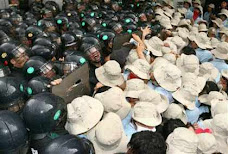I Am Not Georgian
I have staked my country's fate on the West's rhetoric about democracy and liberty. As Georgians come under attack, we must ask: If the West is not with us, who is it with? If the line is not drawn now, when will it be drawn? We cannot allow Georgia to become the first victim of a new world order as imagined by Moscow.
Mikhail Saakashvili
President of Georgia
Dear President Saakashvili:
I know you didn't write to Stumped, but I hope you won't mind my taking the liberty of addressing the questions you raised in the final paragraph of your Steve Clemons has blogged, Washington has enabled your recklessness with its over-the-top rhetoric about democracy and liberty.
At the same time, Russian grievances are justified. The West stabbed Russia in the back when it started expanding NATO eastward, without regard to the facts that 1) NATO is perceived by Russians to be a military alliance created to, well, contain Russia; and 2) we had assured Russia, after the Berlin Wall came down and Moscow agreed to peacefully pull out hundreds of thousands of troops from Eastern Germany, that the West wouldn't encroach on its interests. And now we are establishing anti-missile systems in Poland and the Czech Republic (after unceremoniously abrogating the Anti-Ballistic Missile Treaty) and encouraging former Soviet republics like yours to join NATO.
It's madness. And as much as I can appreciate your parochial at-any-cost desire to be a part of the club, NATO promiscuity and our vindictive yet cavalier treatment of a weakened Russia is harming your long-term security interests as much as ours.
The post-Cold War imperative should have been to create a new collective security arrangement for all of Eastern Europe, outside of the old alliance created to take on Russia. Instead, by admitting Poland, Hungary and the Czech Republic, NATO started creating a hierarchy of states in which Russia might have some right to meddle. Instead of being in the same category of independent nations as Poland, Georgia then found itself on the outside, its exclusion from NATO suddenly more meaningful. Didn't we signal to Russia that it has more leeway to meddle in former Soviet republics than it does in former Warsaw Pact nations? And once the Baltic republics joined NATO, didn't that signal to Moscow, by process of elimination, that former Soviet republics like the Ukraine and Georgia were still part of a Russian sphere of influence? Where does this charade end? Only when every country bordering Russia is a full-fledged member of NATO? In the meantime, hasn't NATO expansion made smaller republics like yours more vulnerable? And how destabilizing is it for a concerned Russia to witness its neighbors' slow transition from longshot candidate to full-fledged NATO member? Advertising that a country's bid to join the military alliance will be considered so many months or years out is an invitation for Moscow to act quicker rather than later if it is upset at the realignment.
In an op-ed in yesterday's Wall Street Journal that could have been written by your hired consultants (oh wait, it probably was), Senator John McCain invoked John Kennedy's famous acknowledgment of Berlin's Cold War status as freedom's frontline when he said: "We are all Georgians now."
Not so fast, I say...
-- Andres Martinez
Suscribirse a:
Enviar comentarios (Atom)































No hay comentarios:
Publicar un comentario